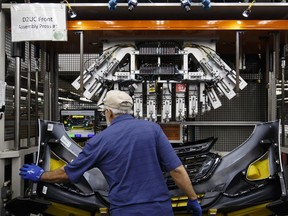Montreal-based TFI International Inc. just announced it was changing its legal domicile to the U.S.
Article content
The threat of widespread U.S. tariffs is forcing some Canadian companies with operations on both sides of the border to contemplate a difficult question: whether to shift production or relocate to the U.S. at a time when patriotic fervour is surging at home.
Article content
Article content
Last week, Montreal-based TFI International Inc. came under scrutiny after announcing it planned to change its legal domicile to the U.S. The trucking and logistics firm cited its larger American shareholder base and the fact that 70 per cent of its operations are now south of the border, but the proposal drew the ire of the Caisse de Depot et Placement du Quebec, one of it’s biggest shareholders.
Advertisement 2
Article content
“We will express our dissatisfaction,” CDPQ spokesperson Kate Monfette said in an emailed statement to Bloomberg News. “Quebec’s interests are always at the heart of our priorities as a shareholder.”
On a Thursday conference call with analysts, TFI chief executive Alain Bedard defended the plan, which still requires shareholder approval, arguing operations would be “business as usual” in the event of a shift.
“We’re not moving people from Canada to the U.S. We’re not doing that. We’re not stupid,” he said.
While TFI is retaining its headquarters in Canada and isn’t planning on relocating staff or offices, Richard Powers, a professor at the University of Toronto’s Rotman School of Management and the national academic director of the Directors Education Program, said in an email that if trucking contracts continue to decline in Canada, he could see an argument to support a bigger move.
“This is just one company, but it does demonstrate the frustration and disruption that is currently going on,” said Powers. “I suspect many firms are doing the numbers and trying to determine if a move makes sense financially — all within an environment with a weak Canadian dollar as well.”
Article content
Advertisement 3
Article content
A January survey from KPMG Canada indeed found that nearly half of Canadian business leaders had plans to shift investments or production to the U.S. to serve the U.S. market and reduce costs in the event that sweeping 25 per cent U.S. tariffs on Canadian goods are implemented, though so far few have followed through.
“I think the threat of tariffs have got Canadian companies exploring and investigating potential shifts in operations from Canada to the U.S., but I’m yet to see a lot of tangible evidence of companies actually doing it at this stage,” said Lachlan Wolfers, tax partner at KPMG in Canada.
“There is such a high level of uncertainty about whether the tariff measures that have been announced represent the calm before the storm or the storm before the calm — in other words, will these measures actually be implemented or not.”
Wolfers said it wouldn’t make sense for Canadian companies to shift their operations to the U.S. entirely if most of their customer base lies in Canada.
He said that there are plenty of details that need to be evaluated first, like setting up new legal entities, hiring and transferring employees and the differences in cost structure when it comes to producing goods or services in a different country.
Advertisement 4
Article content
To make matters more complicated, these companies would also need to consider their next steps if these tariff measures were dropped by the next U.S. administration.
“It’s very difficult to make long-lasting investment decisions on the basis of the information that we know right now,” Wolfers said. “These are not small changes to make in how a company operates and they’re not insignificant to unwind later either.”
Powers said an important sector to watch is the auto industry, pointing to automaker Stellantis Nv, which recently pumped the brakes on a retooling of its assembly plant in Brampton, Ont.
“There are over 2,000 jobs at risk there,” Powers said. “While they have not said that this is because of potential tariffs, you have to think that this pause is really tied to that — and they (are waiting) until they know more.”
General Motors chief financial officer Paul Jacobson also recently said at a Barclays conference that the auto giant might have to consider moving plants if tariffs become permanent but that the company had not made a decision to do so yet. He did not specify whether he was talking about Canadian plants, Mexican plants, or both.
Advertisement 5
Article content
Swamy Kotagiri, chief executive officer of Magna International Inc., a Canadian parts manufacturer for automakers, said in a recent conference call with analysts that he’s heard some of Magna’s customers are considering shifting production to avoid U.S. tariffs.
When asked about Magna’s own flexibility to move production, Kotagiri said, “We’re looking at that and we’ll continue to look at that. But … this is not a switch that can be turned on and off in the short term, so I believe this (the tariffs) is going to be disruptive.”
Robert Yalden, the inaugural holder of the Stephen Sigurdson professorship in corporate law and finance at the Faculty of Law of Queen’s University, said that a landmark 2008 Supreme Court of Canada case held that directors of a company have a duty to do what is best for the corporation and may consider the interests of stakeholders — a group not limited to shareholders or bondholders — but are not required to do so.
However, Yalden noted that companies still need to consider their practical need for capital and noted there are remedies in corporate law, like Canada’s oppression remedy, which protects shareholders, creditors and other complainants from oppressive conduct or conduct that disregards their interests.
Advertisement 6
Article content
Richard Leblanc, professor of governance, law and ethics at York University, said that Canadian companies should proceed carefully, and not just bow to monetary or investor pressure.
He said that having “a knee-jerk reaction” to tariffs by closing shop in Canada, moving to the United States and either terminating employees or compelling them to move, could lead to potential litigation from stakeholder groups, as well as public pressure and reputational issues.
Plus, if a company is receiving any governmental assistance, it might require that employee labour contracts be honoured and that the company continue to be domiciled in Canada.
Recommended from Editorial
-

Who will pay Trump’s tariffs on Canadian oil?
-

Will the Digital Services Tax survive Trump’s tariffs?
-

What is the ‘de minimis’ exemption?
“What we don’t want is a hollowing-out of corporate Canada because of President Trump,” Leblanc cautioned. “I think there are more shoes to drop here and I’m cautioning my board clients to think very carefully, even about considering, or disclosing publicly that you’re considering (redomiciling).”
Article content
Some Canadian companies are considering relocating to the U.S.
2025-02-24 18:57:04








